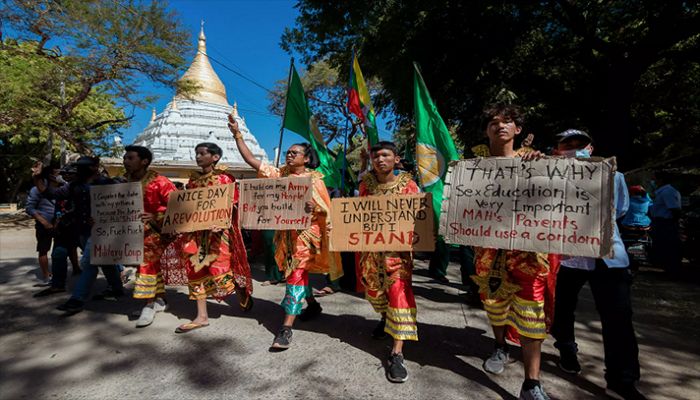
Desk Report
Publish: 31 Oct 2021, 10:43 am

Protesters hold signs against the Myanmar military coup in Bagan on February 10, 2021. || AFP Photo: Collected
US President Joe Biden has vowed a major push to promote democracy worldwide. But since he took office, democracy has faced repeated setbacks, reports AFP.
Among three nations whose democratic transitions had inspired the most hope, Myanmar and Sudan have seen generals roar back, sacking civilian leaders and suppressing street protests, while in Tunisia, the birthplace of the Arab Spring a decade ago, the president seized wide-ranging powers.
Military juntas have also grabbed power in the West African nations of Guinea, Mali and Chad, while in Afghanistan, Taliban insurgents seized power after a US troop withdrawal brought the quick collapse of the Western-backed government.
While local factors are at play in each country, experts see common trends including economic insecurities exacerbated by Covid-19 and climate change, ruling elites who failed to meet aspirations and the growing role of China, which can support nations shunned by the West.
"There is an increase in attacks on democracy around the world -- and not in the demand for democracy," said Derek Mitchell, the first US ambassador to Myanmar after its transition a decade ago.
"It's a matter of old mindsets dying hard, particularly in militaries where people don't give up power and privilege easily," said Mitchell, now president of the National Democratic Institute, which promotes democracy worldwide.
'No magic bullet'
Fulfilling a campaign promise, Biden has announced a two-part summit of democracies starting in December.
He is drawing a sharp contrast with his predecessor Donald Trump, who openly embraced authoritarian leaders seen as useful and who inspired a violent mob that on January 6 attacked the US Capitol as it certified Biden's victory.
With the possible exception of Afghanistan, where Biden's decision to end the two-decade US war has been hotly debated, few link democracy's woes to the current occupant of the White House.
"Democracy takes literally decades to consolidate and it takes years to erode. So I think there's very little that any administration could do in the first nine months tangibly moving the needle on global democracy," said Frances Z. Brown, who worked on supporting democracies in Barack Obama's White House.
Crucially, Biden responded quickly to the coups in Myanmar and Sudan including suspending aid, said Brown, a senior fellow at the Carnegie Endowment for International Peace.
"It shows the United States is watching and it cares. There's no one magic bullet but I think it all matters," she said.
Biden has also taken a distance with Trump allies, halting some military support for Saudi Arabia and leveraging part of its aid to Egypt on human rights progress, although activists say he should go further.
Scott Warren, a visiting fellow at Johns Hopkins University's Agora Institute, said that Biden inviting leaders to a summit was insufficient and that he should prioritize civil society and youth.
"Sometimes the US strategy toward democracies can be very reactive. I think having a more proactive strategy -- what conditions are going to be necessary for the long-term -- is really important," he said.
State Department spokesman Ned Price acknowledged there have been "setbacks in certain countries" on democracy but added, "We will continue to lead that charge."
'Shock to system'
The Economist Democracy Index rated the global state of democracy in 2020 at its lowest since its survey began in 2006, fueled not only by coups but by the rise of right-wing populists in democracies.
Jonathan Powell, an expert in civil-military relations at the University of Central Florida, said the economic blow from Covid-19 has hastened the democratic decay.
"When you have countries that are already dealing with a very delicate balance between authoritarianism and attempting to maintain some form of democratic stability, when you have some sort of a shock to the system, even if it doesn't necessarily seem as bad as what some other countries are dealing with, it can really have a critical impact," he said.
The rise of China has also offered an alternative, he said.
"It's not on the scale that we would have had during the Cold War with the Soviet Union," Powell said.
"But it is a similar dynamic where if you do have one side cut off military or economic assistance, there is a foregone conclusion that you can go to the other side," he said.
Mitchell, the former ambassador, acknowledged the Beijing factor but called it overemphasized, saying Chinese leaders acted opportunistically.
But he said that the United States, with its intense polarization and the January 6 violence, no longer offered the same powerful model.
"Certainly those who are fighting for their own democratic rights are not giving up because the United States can't get its act together," Mitchell said.
"But I think we'd rather have the United States demonstrating how democracy can deliver."
Subscribe Shampratik Deshkal Youtube Channel
Topic : Global democracy worldwide
© 2024 Shampratik Deshkal All Rights Reserved. Design & Developed By Root Soft Bangladesh